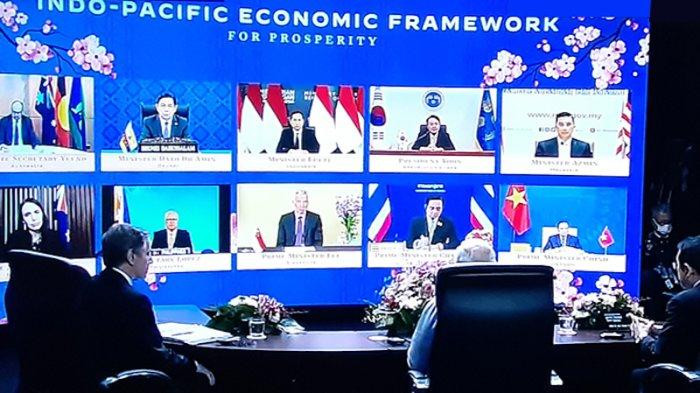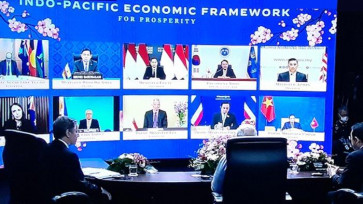Popular Reads
Top Results
Can't find what you're looking for?
View all search resultsPopular Reads
Top Results
Can't find what you're looking for?
View all search resultsBiden’s new trade-pact offer is almost a laughingstock
Despite the US’ repeated denials, its invitation of the ASEAN members was clearly another attempt to persuade them to join the alliance against China.
Change text size
Gift Premium Articles
to Anyone
U
nited States President Joe Biden invited seven of the 10-member ASEAN, including Indonesia, to join the launch of his new trade offensive, aimed at distancing them from China, their most important trading partner. Instead of obtaining any concrete economic advantages, the ASEAN members were there only to hear Biden preach about the latent danger of corruption and the refusal of big corporations to fulfil their tax obligations. Biden lured them to enter his trap, but he was reluctant to use a tempting bait because the “price” would be expensive.
Biden’s initiative, the Indo-Pacific Economic Framework (IPEF), is also a “slap in the face” for Japanese Prime Minister Fumio Kishida because Tokyo was the main champion of the Comprehensive and Progressive Agreement for Trans-Pacific Partnership (CPTPP), an alternative for the Trans-Pacific Partnership which the Trump administration had dumped.
The ASEAN members attended the virtual meeting as a follow-up of the US-ASEAN summit in Washington DC on May 12-13, which was attended by President Joko “Jokowi” Widodo. At that time Biden could only offer angin surga (fake promises) in the form of economic pledges worth US$250 million, miniscule compared to China’s pledge of up to $1.5 billion for three years.
Indonesia sent Trade Minister Muhammad Lutfi for the virtual meeting in Tokyo, perhaps out of curiosity about the IPEF initiative. In fact, the US remains one of the world’s biggest and most lucrative markets, even when compared to China, but Indonesia was aware from the very beginning that IPEF would not constitute a free-trade deal. It seems like a loose trade pact, and probably will not even be legally binding.
Despite the US’ repeated denials, its invitation of the ASEAN members was clearly another attempt to persuade them to join the alliance against China.
The IPEF’s virtual inauguration took place when Biden was in Tokyo to attend the second summit of the loose Quad security pact comprising the US, Japan, India and Australia. The four countries work together to gang up on China. They do not have the guts to confront China one-on-one as their economy is heavily dependent on China. Australia’s previous government under the Conservatives' Scott Morrison tried to fight China’s economic punishing tool, but it remains uncertain if his successor, Prime Minister Anthony Albanese from the Labor Party, will maintain the confrontational approach.
The White House proudly described the launch of IPEF as trade diplomacy that will “enable the US and our allies to decide on rules of the road that ensure US workers, small businesses and ranchers can compete in the Indo-Pacific”. The message aims to convince the US public, who does not want to give economic concessions to US allies.



















